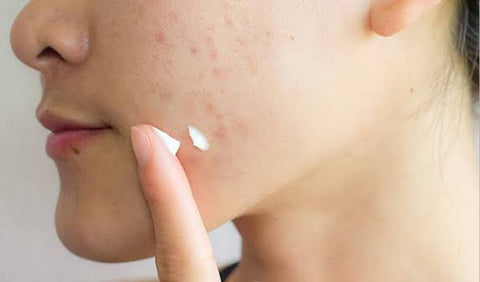Skincare For Acne Prone Skin
Most people probably picture a complexion covered in bright red bumps when they think of acne-prone skin, but there are several other ways that acne can appear. Although acne is the most common skin condition, many people are confused about what exactly it is, which makes treating and preventing breakouts frustrating, if not impossible. The good news is that you can achieve clearer skin by following a consistent treatment regimen.

In reality, what is acne?
The majority of us don’t really understand what acne is, despite the fact that it is the most prevalent skin condition in the US, affecting more than 50 million people annually.
Everything from commonplace whiteheads and blackheads (comedowns) to deeper papules and uncomfortable cysts is referred to as “acne.”
How to get rid of acne permanently?
1. Cleanse your skin
Ideally, you should wash your skin twice daily. Consider using a wash with active ingredients. To lessen any irritation that may result from acne treatments, gentle cleansers without active ingredients are also beneficial. Consider using an exfoliating cleanser once or twice per week to remove dead skin cells. Utilize the Acnof Cleansing Gel twice daily.
Powerful yet gentle enough for skin that is overly sensitive. It is a clear, light-weight cleansing gel. The skin’s surface and pores are thoroughly cleaned by the cleansing complex without removing any of the skin’s natural oils. It stimulates cellular turnover by exfoliating and dissolving pore-clogging oil, tightens pore appearance, and soothes and heals the skin. Anti-Blemish Cleansing Gel has been clinically proven effective. .
2. Put on SPF
Whether you have acne or not, the best thing you can do for your skin is to wear a broad-spectrum, oil-free sunscreen every day. Because acne treatments such as retinol, benzoyl peroxide, and salicylic acid make your skin more susceptible to the sun, it is crucial to wear sunscreen.
Bioxcin Suncare cream SPF Sunscreen also aids in reducing any redness or dark spots that may still be present after acne has cleared up. There are no chemical UV filters in Radiant Ultra Sunblock, a physical sunscreen with a tint for the face. In an oil-free, lightweight, water-resistant formulation, zinc oxide and titanium dioxide offer mineral-based sun protection.
This mineral sunscreen offers broad-spectrum protection from the sun’s harmful UVA and UVB rays. Our barely tinted UV Physical is a sensible option for oil-free sun protection with a hint of colour. Antioxidants in this organic mineral sunscreen neutralize free radicals without the use of chemicals. UV Physical can withstand moisture, perspiration, and water. A UVA and UVB-protective broad-spectrum sunscreen.
3. Don’t forget to moisturize
Although moisturizing skin that is already oily may seem counterproductive, acne treatments are drying, so it’s crucial to maintain skin moisture and support the skin’s natural barrier. Just be sure to pick a moisturizer that is noncomedogenic and oil-free to avoid clogging pores and causing acne.
4. Don’t exfoliate too much
While it may be tempting to try to scrub acne away, excessive exfoliation can dry out the skin, aggravate irritation, and worsen breakouts.
4. Expecting results right away is unrealistic
A new product won’t start to make a difference until at least six to eight weeks have passed. Avoid giving up too quickly! Breakouts from acne don’t appear overnight, and they also don’t disappear instantly. Avoid abandoning acne treatments too soon.
Before they “declare” themselves as effective or not, topical acne medications should be used for 8–12 weeks. Rapid product rotation is counterproductive. Attempt to avoid touching your skin with your hands while you wait. Acne should not be picked or popped, despite how tempting it may be.
The follicle is ruptured, and the inflammatory area is widened. A larger area of skin discoloration might result from this. Additionally, it raises the possibility of scarring and might result in a bacterial infection.
5. Don’t use a lot of makeup
Particularly if it is oil-based and heavy, makeup can clog pores and cause acne. Your skin’s ability to breathe is also compromised by these products.
6. Stop popping your pimples
When you pick or pop your pimples, you not only make a small pimple look much worse, but you also increase the likelihood of scarring and the length of time it takes for them to heal.
7. Take Control Of Your Acne
Acne symptoms can be diminished, and breakouts can be avoided, with the use of an efficient skin care routine. Acne, however, cannot be treated quickly. Before you notice any changes in your skin as a result of a new product, it may take up to three months. The key is to commit to a daily anti-acne routine, not just when you notice a breakout beginning.
